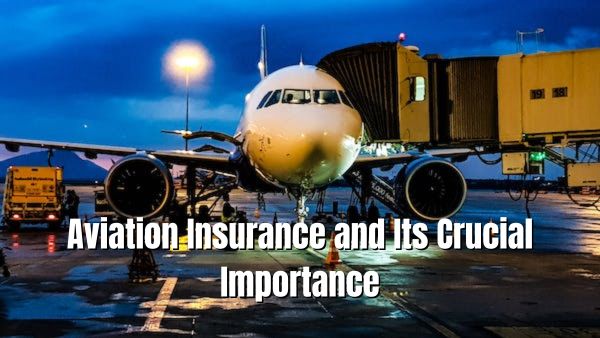Aviation Insurance and Its Crucial Importance
Aviation insurance plays a pivotal role in safeguarding the aviation industry, ensuring the protection of both individuals and businesses involved in air travel. This form of insurance is designed to cover a wide range of risks and liabilities associated with aircraft operations. In this article, we will explore the basics of aviation insurance, its various components, and why it is so crucial in the realm of air transportation.
What is Aviation Insurance?
Aviation insurance is a specialized form of coverage that provides financial protection against risks related to the operation of aircraft. This insurance encompasses a broad spectrum of potential liabilities, ranging from damage to the aircraft itself to third-party bodily injury and property damage. It is essential for everyone involved in aviation, including aircraft owners, operators, pilots, and maintenance personnel.

Components of Aviation Insurance:
- Hull Insurance:
Hull insurance, also known as aircraft hull insurance, covers physical damage to the aircraft itself. This can include damage caused by accidents, collisions, or other unforeseen events. The coverage may extend to the entire aircraft or specific components, depending on the policy. - Liability Insurance:
Aviation liability insurance covers bodily injury and property damage caused to third parties as a result of aircraft operations. This includes passengers, bystanders, and individuals on the ground. Liability coverage is crucial for protecting against legal claims and ensuring that affected parties receive compensation for their losses. - Passenger Liability Insurance:
This component specifically focuses on the passengers aboard an aircraft. In the event of an accident leading to injury or death of passengers, passenger liability insurance provides coverage. It helps compensate passengers or their families for medical expenses, lost income, or other damages resulting from the incident. - Cargo Insurance:
Cargo insurance safeguards the goods and freight transported by an aircraft. In the event of damage, loss, or theft of cargo during transit, this coverage ensures that the cargo owner or shipper receives compensation for their financial losses. - Hangarkeepers Insurance:
Hangarkeepers insurance protects against damage to aircraft while they are stored in a hangar. This coverage is essential for hangar operators who may be held responsible for damage to aircraft under their care.
Importance of Aviation Insurance:
- Financial Protection:
The aviation industry involves significant financial investments in aircraft, equipment, and operations. Aviation insurance provides a safety net, ensuring that financial losses resulting from accidents, damages, or liabilities are covered. This financial protection is crucial for the sustainability of aviation businesses. - Compliance with Regulations:
Aviation insurance is often a legal requirement imposed by aviation authorities. Aircraft operators must comply with regulations that mandate certain levels of coverage to ensure public safety and the financial responsibility of aviation entities. - Risk Management:
Aviation is inherently risky, with various factors such as weather conditions, mechanical failures, and human error contributing to potential accidents. Insurance acts as a risk management tool, helping aviation professionals mitigate the impact of unforeseen events on their operations. - Ensuring Business Continuity:
For businesses involved in aviation, the continuity of operations is vital. Aviation insurance plays a crucial role in ensuring that an organization can recover and continue its activities after a covered event, minimizing the disruption to services and maintaining the trust of clients and stakeholders. - Protecting Stakeholders:
Aviation insurance not only safeguards the interests of businesses but also protects the interests of passengers, cargo owners, and other stakeholders. In the event of an accident, insurance ensures that affected parties are fairly compensated for their losses, promoting trust and accountability within the aviation industry. - Global Operations:
Aviation often involves international travel and cross-border operations. Aviation insurance policies can be tailored to cover risks associated with global operations, providing comprehensive protection for aircraft and personnel regardless of their location. - Safety Culture:
Knowing that there is financial protection in place fosters a safety culture within the aviation industry. This encourages adherence to safety protocols, training, and maintenance standards, as insurance premiums may be influenced by the safety record of the insured parties.
Conclusion:
In conclusion, aviation insurance is a vital component of the aviation industry, serving as a comprehensive risk management tool. From protecting against physical damage to aircraft to providing coverage for liabilities arising from operations, this form of insurance ensures the financial stability of aviation businesses and the well-being of individuals involved in air travel. The importance of aviation insurance extends beyond mere compliance with regulations; it is an essential element in sustaining a safe, reliable, and resilient aviation sector. As the industry continues to evolve, the role of aviation insurance remains paramount in securing the future of air transportation.
When is the Other Driver at Fault? Can I Get Compensation for my Car Accident Injury?
